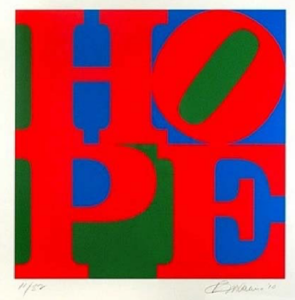he CDAS litigation team—led by partners Scott Sholder and Ben Halperin with assistance from associates CeCe Cole and May Gunther—won a decisive victory on behalf of longstanding firm client Artists Rights Society, Inc. (ARS) in the action McKenzie v. Artists Rights Society, Inc., No. 22 Civ. 1619 (JHR) (S.D.N.Y.).
On November 15, 2024, Judge Jennifer H. Rearden of the S.D.N.Y. dismissed art publisher Michael McKenzie’s lawsuit alleging that ARS’s licensing of Robert Indiana’s famous LOVE design violated the Lanham Act and the Racketeering Influenced and Corrupt Organization Act (RICO). The court dismissed the case with prejudice, fully agreeing with CDAS that McKenzie’s claims were both meritless and untimely.
For decades, ARS has licensed reproductions of Robert Indiana’s artwork worldwide, including the iconic 1964 LOVE image. McKenzie claimed the right to license a similar Indiana image—HOPE, which gained popularity in connection with President Obama’s 2008 campaign:


McKenzie alleged that ARS falsely required a copyright notice to be included on LOVE merchandise when, according to McKenzie, the work is in the public domain and no longer subject to copyright protection. McKenzie claimed that HOPE could not fairly compete with LOVE in the art market due to the latter’s copyright notice. In an expansive amended complaint, McKenzie claimed not only false designation of origin and false advertising, but that ARS and others engaged in a RICO scheme to falsely market LOVE, purportedly entitling him to “treble damages.”
The court first agreed with CDAS that McKenzie’s Lanham Act claims were not actionable under the Supreme Court’s decision in Dastar Corp. v. Twentieth Century Fox Film Corp., 539 U.S. 23 (2003), which bars trademark and false advertising claims based on alleged misrepresentations about intellectual rights (including copyright status or ownership).
The court next agreed that McKenzie could not establish causation for any of his theories. While McKenzie alleged that he was harmed because consumers favored LOVE due to its copyright notice, the court found that he “fail[ed] to allege, as he must, that consumers … were deceived by” the copyright notice and that this in fact “is what led consumers to withhold trade from Plaintiff.”
Similarly, as to RICO, the court found that “there are ‘any number of reasons unconnected to the asserted pattern of fraud’ why Plaintiff could have experienced lost sales or diminished marketability relating to the HOPE image vis-à-vis LOVE.” Most notably, LOVE has been an iconic work for decades, whereas “HOPE was known for its connection to the Obama campaign, and its popularity may have diminished simply because that campaign ended.”
The foregoing issues cut to the core of the case: in actuality, the presence or absence of a copyright notice on merchandise is simply not material to consumers. Consumers purchase art and art merchandise because they like the way it looks and makes them feel, not because of a small copyright notice.¹
Finally, the court agreed that all of McKenzie’s claims were untimely, recognizing that McKenzie, “a self-described ‘prolific art publisher’” with ties to Indiana, was long aware of his grievance but delayed taking legal action “for well over a decade.”
This result underscores the importance of carefully analyzing intellectual property complaints and attacking the allegations from multiple angles, both substantive and procedural. The result is important for both ARS and the art world broadly, as wild and false claims of fraud and racketeering threaten to disrupt the legitimate and vital advancement of art and culture.
For additional coverage, see Law360’s report on the decision at https://www.law360.com/articles/2262352/art-org-freed-from-suit-over-fake-love-copyright-claim.
¹ The issue of whether LOVE is in the public domain was not decided in the lawsuit.
Filed in: Art Law, Photography, & Design, Litigation and Alternative Dispute Resolution
November 20, 2024